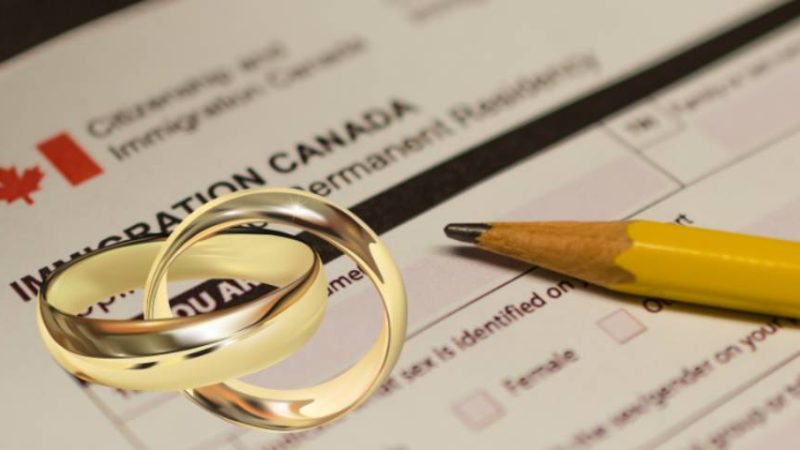🍁 Marriage Immigration Laws in Canada: 2025 Spousal Sponsorship Guide
🔹 Introduction
Canada is one of the most immigration-friendly countries in the world — and marriage immigration is one of its most welcoming pathways.
Through the Spousal Sponsorship Program, a Canadian citizen or permanent resident can sponsor their foreign spouse or partner to become a permanent resident of Canada.
In this guide, we’ll break down Canada’s marriage immigration laws, eligibility rules, required forms, timelines, and important tips to avoid rejection.
🔹 What Is the Spousal Sponsorship Program?
The Spousal Sponsorship Program is part of Canada’s Family Class Immigration system, regulated by Immigration, Refugees and Citizenship Canada (IRCC).
It allows a Canadian citizen or permanent resident (PR) to bring their foreign spouse, common-law partner, or conjugal partner to Canada permanently.
💡 Unlike temporary visas, spousal sponsorship leads directly to permanent residency.
🔹 Who Can Apply?
You may be eligible for marriage immigration to Canada if:
The sponsor:
-
Is at least 18 years old
-
Is a Canadian citizen or permanent resident
-
Can financially support their spouse for 3 years after arrival
-
Is not receiving social assistance (except for disability benefits)
The applicant (foreign spouse):
-
Is legally married or in a recognized partnership with the sponsor
-
Has passed medical, background, and security checks
-
Is admissible to Canada (no serious criminal record or past immigration violations)
👉 Related: Required Documents for Marriage Immigration

🔹 Types of Sponsorship in Canada
| Type | Description | Where You Apply |
|---|---|---|
| Inland Sponsorship | For couples already living together in Canada (foreign spouse has valid status) | Inside Canada |
| Outland Sponsorship | For couples where the foreign spouse lives outside Canada | Outside Canada (via embassy or visa center) |
💬 Tip: If your spouse is already in Canada on a visitor or student visa, you can apply for Inland Sponsorship and also request an Open Work Permit while waiting.
🔹 Legal Definition of Marriage Under Canadian Law
According to IRCC, a marriage is legally valid for immigration purposes if:
-
It was legally recognized in the country or province where it took place
-
Both partners were physically present during the ceremony
-
It was freely entered into (no coercion or forced marriage)
Canada recognizes:
-
Opposite-sex and same-sex marriages
-
Common-law partnerships (cohabiting for 12 months or more)
-
Conjugal partnerships (long-term relationships unable to live together due to legal or immigration barriers)
For broader context on other regions, check:
🌍 Rights of a Foreign Spouse in Europe
🔹 Required Forms and Documents
Here are the key forms under the IRCC spousal sponsorship package:
| Form | Purpose |
|---|---|
| IMM 1344 | Application to sponsor, sponsorship agreement, and undertaking |
| IMM 5532 | Relationship information and sponsorship evaluation |
| IMM 0008 | Generic application form for permanent residence |
| IMM 5406 | Additional family information |
| IMM 5669 | Background / declaration form |
In addition to these, you’ll need:
-
Marriage certificate
-
Proof of relationship (photos, chats, shared bills)
-
Police clearance certificates
-
Medical exam results
📎 Detailed list: Required Documents for Marriage Immigration
🔹 Processing Time and Fees
| Item | Duration / Cost |
|---|---|
| Application Processing | 10–14 months (average 2025) |
| Sponsorship Fee | CAD $85 |
| Principal Applicant Fee | CAD $515 |
| Right of Permanent Residence Fee | CAD $575 |
| Biometrics | CAD $85 |
| Medical Exam | CAD $200–$300 |
⏳ Total: ~12–15 months from start to finish (average 2025 estimate).
🔹 Common Reasons for Rejection
-
Incomplete or unsigned forms
-
Insufficient proof of relationship
-
Inconsistencies in interview answers
-
Past immigration violations
-
Doubts of a fake or arranged marriage
To understand legal risks, see:
⚖️ Fake Marriage for Immigration: Legal Risks
🔹 Rights and Responsibilities After Sponsorship Approval
Once approved:
-
The sponsored spouse becomes a Canadian permanent resident
-
They gain free healthcare (Medicare), the right to work, and access to education
-
The sponsor must financially support the spouse for 3 years
-
The spouse may apply for Canadian citizenship after 3 years of residence
🔹 Key Legal Notes for Sponsors
-
Sponsors cannot withdraw financial responsibility once the PR visa is issued
-
Divorce does not cancel the 3-year financial obligation
-
If the marriage is found fraudulent later, both parties could face serious penalties, including deportation and criminal charges
💡 Always ensure honesty and consistency in all submitted information.
🔹 How to Strengthen Your Application
✅ Submit clear, chronological proof of your relationship
✅ Keep communication records (emails, travel tickets, photos)
✅ Include both families in your story (letters, photos, declarations)
✅ Write a Relationship Timeline Letter explaining how you met
✅ Double-check all forms before submission
🔹 Final Thoughts
The marriage immigration laws in Canada are designed to reunite genuine couples — but they also enforce strict checks to prevent abuse.
If you prepare your documents carefully and your relationship is real, you can expect a smooth sponsorship process.
Canada remains one of the best destinations for couples seeking a fair, transparent, and welcoming immigration system.
For next steps, check:
➡️ Fake Marriage for Immigration: Legal Risks
➡️ Legal Advice for Marriage Immigration







